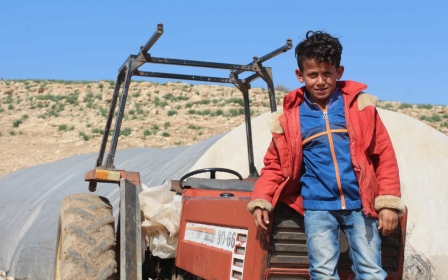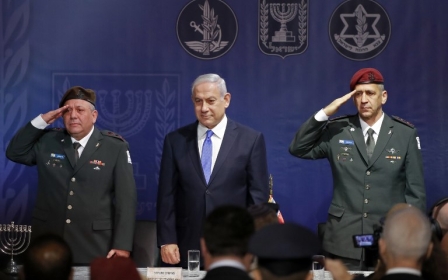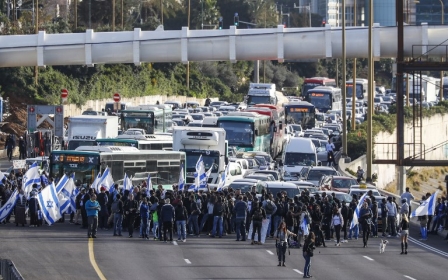Israeli press review: Soldiers charged after beating detained Palestinians
Five Israeli soldiers charged with beating Palestinians
Five soldiers have been indicted by the Israeli army on charges that they beat and humiliated two Palestinian prisoners, a father and son, in the occupied West Bank, Haaretz reports. One of the two was reportedly beaten so badly that he was not able to undergo questioning at the time, and lay in Jerusalem’s Shaare Zedek hospital for three days afterwards.
On 8 January, the father and son were arrested in Abu Shuhaydam, a village north of Ramallah, and as they were being driven handcuffed to the Israeli army base in the illegal Jewish settlement of Beit El, the troops reportedly pummelled them with their fists and with sharp objects, causing considerable injury.
Aggravated circumstances clauses were added to the soldiers’ charge sheet, on account of the cruelty with which they are alleged to have beaten their victims. According to Haaretz, the soldiers removed the covering that they had wrapped around the son’s eyes, and demanded that he watch as they beat his father, breaking his ribs and nose.
The indictment notes that the soldiers recorded the assault themselves, and that on their recording they can be heard shouting with joy.
The soldiers’ military lawyers said in a statement that the indictment should never have been handed down, because the Palestinian father and son were suspected of an attack on another soldier in their unit the month previous, putting the troops arresting them in “an impossible situation”.
Gantz jumps ahead in polls after speech
In the first surveys of the Israeli electorate following former army chief Benny Gantz’s speech outlining his political vision, his Israeli Resilience faction has overtaken all other political parties, whether currently in the opposition or the coalition government – with the exception of Prime Minister Benjamin Netanyahu’s ruling Likud party.
Following his first public speech as a political candidate on 29 January, a Channel 13 News poll gives Israeli Resilience 24 seats in the next Knesset to the Likud’s 30 seats, while a parallel poll by national broadcaster Kan gives Gantz’s party 23 seats to the Likud’s 31. Both surveys indicate that the third-largest party in the Knesset would be the Yesh Atid party of Yair Lapid, projected by both sources to win nine seats.
As expected, Gantz announced that another former army chief, ex-Defence Minister Moshe “Bogie” Yaalon, would join forces with the Israeli Resilience list in the upcoming national elections, to be held on 9 April.
Now Gantz is reportedly specifically seeking out women and Mizrahim – Jews of Arab descent – to add to his party slate, since at present it is entirely composed of Ashkenazi men - Jewish men of northern European descent. One of the women Gantz is said to be considering is Adina Bar Shalom, leader of the novice Israeli Brother party and sister of Israel’s Chief Rabbi Yitzhak Yosef.
Women candidate's posters getting defaced
After one Israeli political party made combating the exclusion of women from the public sphere a plank of their election campaign, concerns have been proven valid: the face of a female candidate from another party was sliced out of a banner on a major Jerusalem highway on 30 January, News 13 reports.
The banner urging Israelis driving along Begin Road to vote for the Gesher party was seemingly targeted by vandals because it prominently features the visage of the party leader, sitting MP Orly Levi-Abeksis, who is a woman.
Last week, the Meretz party, half of whose representatives in the Israeli parliament are women, announced that it would file a lawsuit against the central city of Bnei Brak, for refusing to allow the display of its own campaign posters because they feature the face of party leader Tamar Zandberg, also a woman.
“Excluding women from the public amounts to an assault on equality,” Zandberg said, calling on Israeli women and girls to use the hashtag #YouWillNotEraseMe.
Vandalism against public posters featuring the faces of women has been a recurring phenomenon in Israel, especially in areas with large concentrations of ultra-Orthodox Jews.
In the run-up to elections for Israel’s parliament in 2009, posters featuring the face of Tzipi Livni – then the acting leader of the ruling party – were regularly ripped up by unknown saboteurs. Earlier this week, Livni announced that her HaTnuah party would compete in the upcoming elections as an independent faction, untethered to any other party as it has been in the last two Knesset races.
New MEE newsletter: Jerusalem Dispatch
Sign up to get the latest insights and analysis on Israel-Palestine, alongside Turkey Unpacked and other MEE newsletters
Middle East Eye delivers independent and unrivalled coverage and analysis of the Middle East, North Africa and beyond. To learn more about republishing this content and the associated fees, please fill out this form. More about MEE can be found here.




